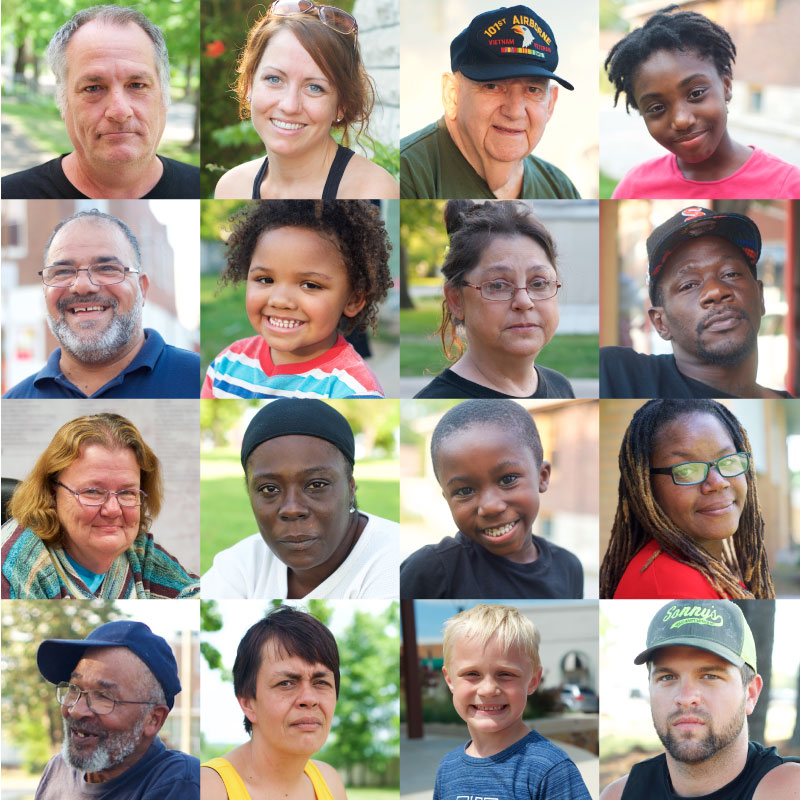
When we launched our campaign #TheNetBenefit last summer, we already knew we were dealing with a critical issue. Our goal was a timely one – to educate about the importance of the social safety net, and how we are collectively better off when our fellow Missourians have access to the food, shelter, health care, and economic supports they need to lead healthy lives. After all, many of the resources in place to help people in their times of need were stretched to the point of breaking, and several were under threat. What we didn’t predict was our current partial federal government shutdown, and how it would force this issue to the top of our national conversation, shining a spotlight on how essential the health and social safety net really is. Federal programs like SNAP (food stamps), HUD (housing subsidies), and many others are facing the unprecedented possibility that they will run out of funds. At the same time, community-based supports like food pantries are straining under the pressure of increased need. This shutdown, now the longest in our government’s history, portends true catastrophe for many Americans who were already struggling to get by. The ripple effects, from what has become an assault on our communities, are being felt far and wide. It is time that we all lend a voice to those who are struggling and speak up for the #TheNetBenefit we all see from a strong safety net.
Federal employees are at the forefront of the shutdown. Thousands are either furloughed or expected to work without a paycheck, including approximately 12,000 in Missouri. With a large majority of U.S. workers living paycheck to paycheck, the need for a safety net for those suddenly without an income is substantial. If this was the only impact of the government shutdown, it alone would put a substantial weight on our support structures.
Missourians are also now beginning to feel the effects of unfunded federal agencies, many of which make numerous local services possible. These programs include linchpins in our nation’s safety net – SNAP (food stamps); Women, Infants, and Children (WIC) Supplemental Nutrition Program; the National School Lunch Program; the Federal Transit Administration’s public transportation programs; USDA’s funding for rural elderly and disabled housing assistance; Temporary Assistance for Needy Families (TANF); Housing and Urban Development’s subsidized housing for elderly, disabled, and low-income families; and the Justice Department’s Office on Violence Against Women program funding. These programs help numerous Missouri agencies, including health departments that administer WIC, domestic violence shelters, and OATS Transit, which provides services in 87 rural counties and is the largest rural transit provider in the country.
Put simply, the health and well-being of every Missouri community depends on these programs.
Most of the programs mentioned above remain operating for now, but have deadlines looming. Agencies are scrambling to patch together contingency plans and temporary fixes, while acknowledging that these will be short-lived and woefully inadequate. Close to home, organizations like the United Way of Greater St. Louis, Council of Churches of the Ozarks Crosslines, Guardian Angel Settlement, Springfield Dream Center, and many others are stepping up to provide utility assistance, food, and personal care items.
Meanwhile, Missourians that rely on the safety net to make ends meet are facing new levels of anxiety. For example, SNAP recipients received February payments early to take advantage of existing funds, but if the shutdown extends into March it seems unlikely the program will continue to function fully. While the direct effects on program participants have not yet fully unfolded, as short-term fixes run out we will see a huge uptick in the number of Missourians adversely affected. The direct effects on low-income and elderly citizens are already appearing – last week tenants in HUD-supported housing in four states, including Missouri, were informed of rent hikes due to the shutdown, a precursor to possible evictions.
The shutdown is driven by a deep divide in our country. It has, however, had the unintended consequence of highlighting a unifying value that undergirds our nation’s democracy – to promote the general welfare. Our health and social safety net delivers on that commitment. The shutdown brings government funding into stark relief as the essential backbone of our safety net. The scale of funding streams that could stop in March – in Missouri SNAP payments alone total over $84 million a month – underscores the extensive potential harm to our most vulnerable citizens and to our social fabric.
For affected federal employees in Missouri, not getting paid was undoubtedly unexpected. Yet they are experiencing what many other Missourians experience routinely – finding themselves in circumstances beyond their control that adversely influence their ability to pay rent, buy food, and get to a clinic for care. No one should have to choose between putting food on the table or paying for much-needed prescriptions, shutdown or not! The shutdown should remind us all that at one time or another, most of us will need help, often because of situations that effectively prevent a fair shot, not only at the American Dream, but even making ends meet. As a people we have stated that we believe in the “net benefit;” we care about our society’s general welfare. It is ironic that the shutdown, driven by an unfortunately deep political divide, calls on us to reaffirm our collective commitment to forming a “more perfect union.” It compels us to strengthen, not weaken, the safety net that does just that – offers safety for those in need, while providing a mechanism to foster the human potential within us all!

